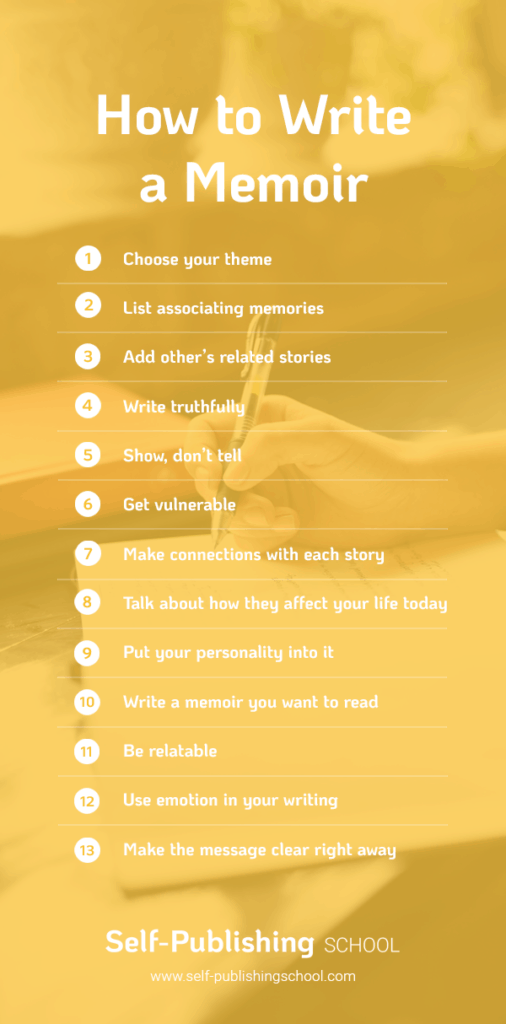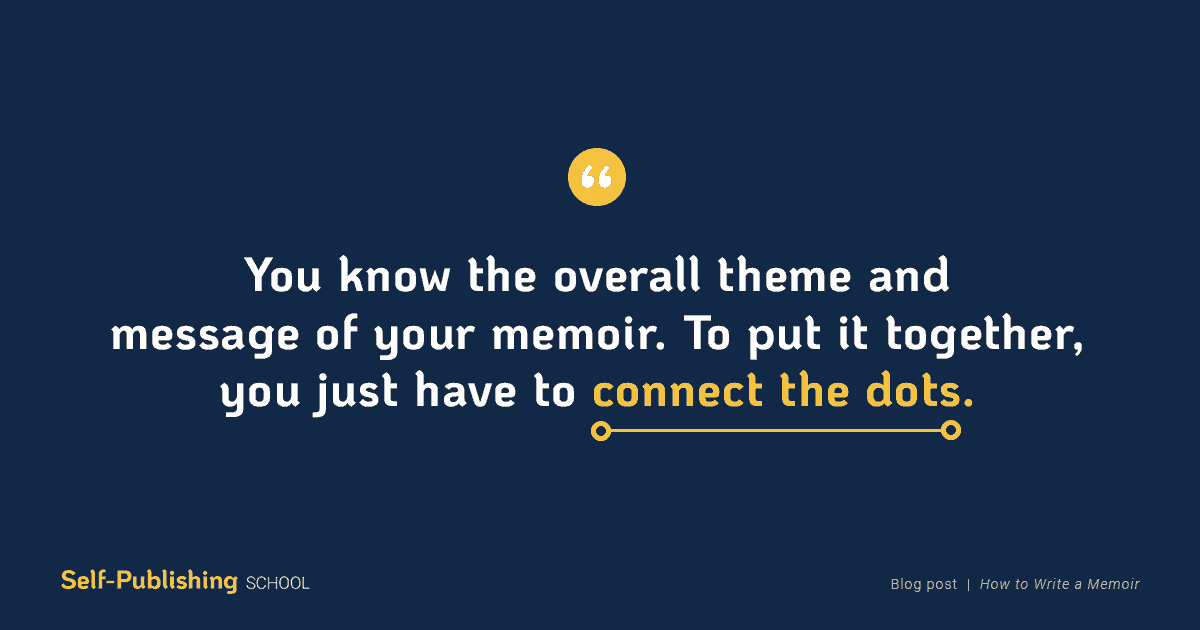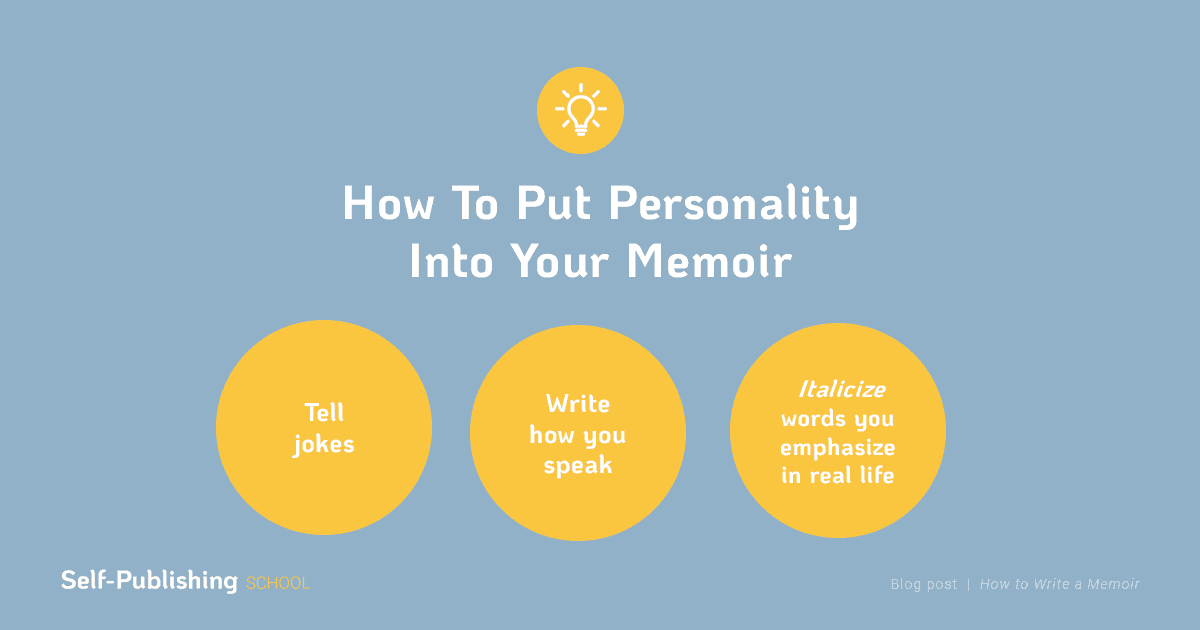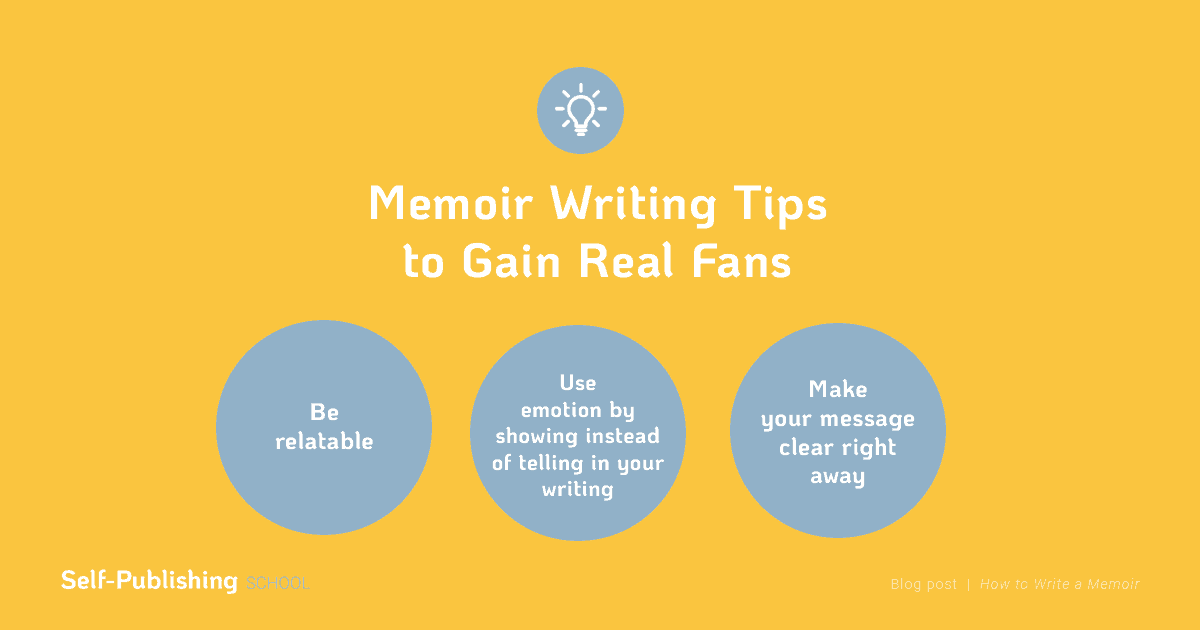How to Write a Memoir Self Help Book
Learning how to write a memoir might seem simple…
You may think it easy to jot down details about your life in a cohesive, entertaining fashion…but there's quite a bit more to and this is where we see a lot of writers fall short.
Our student Nadine Blase Psareas sure thought so before joining Self-Publishing School.
The thing is, if you're like Nadine, you probably don't even know what you're missing to take your idea of a memoir and turn it into something tangible and effective in aiding others.
Memoirs can be very complex pieces of work. It takes a lot of skill and craft to be able to write down intimate details about your life for others to read and learn from.
Which means learning how to write (and even publish/market) a memoir can be really hard.
But the great part?
Like Nadine, you'll learn that writing a memoir is both empowering and rewarding, and when broken down into these feasible steps, it's something you can learn to master in no time.
Which is exactly what Nadine did when she published her own memoir, Hope Dealers, with us, a journey of the struggles of addiction, health issues, entrepreneurship, and more.
Here are the steps for how to write a memoir:
- Choose your memoir's theme
- List associating memoir memories
- Add others' related memories
- Write your memoir truthfully
- Show, don't tell when writing a memoir
- Get vulnerable with your memoir
- Make connections with each story
- Add the impact in your life today
- Put your personality into it
- Write a memoir you want to read
How many people can say they wrote a book detailing the most impactful moments of their lives?
Not many.
And by taking this leap and diving headfirst into your memories and entire life, you're reaching new heights for yourself and you may even enlighten others by the end of your journey.
Top 5 Memoir Questions Answered First
There's so much to know about memoirs. Let us answer some of the most popular questions before we dive into the full steps of how to write your memoir.
What is a memoir?
A memoir is a historical account or biography written from personal knowledge or special sources. It's a book about your life, the lessons learned, and key moments that shaped who you are.
We all typically think of a memoir and cringe a little at the idea of a book about someone else's life. But that's not all a memoir is!
Essentially, this is a book written by you about key moments in your life. You bring your memories to life in order to touch on an overarching message others can learn and grow from.
It's like the highlight reel from your diary (if you ever had one) about the experiences that shaped your life.
And even though you're technically writing a nonfiction book, memoirs should be more in the category of "fiction" when it comes to the style and flow of the book. It's an entertaining read fashioned like a story…it just so happens to be true.
[Want to see some of our students' books? Check out the SPS Library here !]
What Qualifies as a Memoir?
A memoir is unique in the fact that it covers your life's events in a more story-like structure with an overarching theme or message written in.
This means that "how-tos," "motivational books," "self-help books," and other topics don't qualify as a memoir. Memoirs are very specific in the sense that it accounts for the entirety of your life with an emphasis on stories and impactful moments that lead to a great purpose.
Memoir Definition
A memoir is a historical account written with personal knowledge and experience covering the lifetime of an individual, usually with a greater purpose or message within it. It's your life story and therefore your own story.
How long should memoirs be?
The length of a memoir for the average person should stay between 50,000 – 60,000 words. Unless you're a Matthew McConaughey writing something to the level of Greenlights (that sits at just over 90,000 words), you can't often get away with writing longer memoirs.
Can anyone write a memoir?
Yes, anyone has the ability and experience to write a memoir. The biggest misconception is that you have to be famous or have to have experienced something major in order to write a memoir. But that's not needed.
In fact, some of the most powerful memoirs can come from the "average" person detailing the biggest lessons in their life.
You have a story. Everyone has a story, and what we do here at Self-Publishing School is get that story out and into a book you can pass down for generations.
Check out our program that specializes in memoirs that make an impact.
What the difference between a memoir vs autobiography?
A memoir typically covers one aspect of a writer's life (or a continuous theme through memories), while an autobiography is a chronological account of the writer's life.
With so many book genres and writing terminology out there, knowing the differences between a memoir vs autobiography, (AKA: works of writing that are basically the same) can be confusing.
They're both about someone's life written by themselves, right? Right.
But they do differ in a single way that really makes a memoir vs an autobiography completely different in terms of their end results.
For example, Nadine's memoir touches on many parts of her life, but the core focus is to help addicts and those with several life struggles get back on their feet.
So if you want to write a play-by-play of your entire life from the moment you popped into this world to the very second you started writing, you'd write an autobiography.
But if you're looking to share a profound message with the world through your own real-life experiences, you'll write a memoir.
How to Write a Memoir with Meaning and Influence in 10 Steps
Writing a memoir can not only be a valuable experience for you, but the impact it may have on other people is astounding too.
You have a life worth something.
You have experiences that led you to a very specific place in life, and you know what?
Others have undoubtedly been in your shoes before and will benefit from you writing a book.
Essentially, you can teach others how to get through what you did or even how to learn from their own journeys just as you have yours.
That's the meaning of a memoir and its influence knows no bounds.
Writing a memoir can be difficult simply because it's about your life, not to mention the fact that you want to write your prose in an engaging way—much like narrative writing.
Somehow, we find it too hard to put our own lives into words through a meaningful message.
How do you really sum up an accumulation of years and years of experience in only a couple hundred pages?
We'll help you learn how to write a memoir worth reading – and sharing.
#1 – Choose the focus or theme for your memoir
A memoir isn't just a list of all the experiences in your life. If it were, you'd call it an autobiography.
What sets memoirs apart from a simple retelling of your life is an overarching theme or message that others can take away from it – and that you personally learned from the stories you share.
Think about what you want others to take away from reading your memoir.
What will they learn or realize or gain from reading about your life? You can ask yourself those very same questions about your life to find the answers.
What have you learned throughout your life? What's the number 1 message that your experiences have taught you?
Once you have that big, broad idea, the real work begins.
It's time to do a little mind mapping.
Now that you know the overall theme and message of your memoir and what will set it apart, you have to connect the dots of your life to that core focus.
Here are a few areas to think about specifically to help jog some of those memories in order to help you know how to write a memoir worth reading:
- Childhood influences
- Grade school
- Teenage years
- First job/s
- First love/s
- Parents
- Siblings/family
- Friends
- College/post high school
- Marriage
- Children
- Grandchildren
- Hopes and dreams
- Aspirations
- Failures
- Successes
- Regrets
- Resentments
There are so many areas that have a direct influence over how you perceive life as a whole. You just have to do a little digging to spark some specific memories that can circle back to the overarching theme of your memoir.

I know this is a book about your life but it never hurts to back up your own experiences with someone else's – or many other people's.

Knowing how to write a memoir involves knowing when your message will be loudest. And that's often with additional stories from others.
Sometimes you can't always get the message across if only you have experienced it. To get readers to relate, you might have to show them that many people experience the same thing.
One of the most powerful connections you can make to benefit from the message of your memoir is to show your readers that it's not just you .
Others have gone through the same situations you have and came out with the same perspective.
This one requires some extensive research (and maybe even an interview or two), but possessing the ability to be credible in your readers' eyes is crucial. And obviously, you'll want to make sure you're using their experiences legally in your memoir.
You can even interview family or friends who might see an experience you share differently than you.
Adding those details will strengthen your core message.
#4 – Write truthfully
One of the hardest parts about writing a memoir is the fact that we tend to be a wee bit biased with ourselves.>
*Gasp* You don't say!
It's true. Nobody really likes to admit their faults.
It's one thing to recognize when you were wrong in life, it's another to actually write it down for the world to see.
It's hard. We want everyone to see the best version of ourselves and therefore, we leave out details or flat out lie to seem "better" in their eyes.
But that's not what makes a good memoir.
In order to learn how to write a memoir that really touches people in deep, emotional ways, you have to learn to be honest.
#5 – Show, don't tell in your memoir writing
No, this doesn't mean you have to write a picture book. That's not what "show" means in this case.
When it comes to creating intrigue with your writing – and trust me, you want to do this, especially for a memoir – you have to write by showing, not telling.
For the sake of brevity, I'll just give you an overview of this writing technique, but if you're interested in mastering the ability to pull readers in, you can check out this detailed explanation.
Essentially, showing versus telling is the way in which you describe your experiences with an emphasis on emotion.
But that doesn't mean you should write down every feeling you had during a specific time. In fact, that's what you want to avoid.
We'll cover this in more detail below, but here's a great video outlining this method↓
#6 – Get vulnerable
Memoirs are not a time to distance yourself from your inner feelings.
Quite the opposite, actually.
It's time to dig deep and show the world what kind of author you are through your life experiences by getting vulnerable.
Open yourself up to the truth behind who you are today. If you shield yourself in any way, it's going to be obvious on the pages of your memoir and therefore, not as effective.
At first, you may want to cringe while writing certain memories but after a few days, you'll find it easier to share your truth.
And best of all? You'll be happy you did.
#7 – Make connections with each story
You have your focus, right? Having that overarching message is going to help you tie all of your memories together in a cohesive manner.>
Each story you tell – whether it's yours or someone else's – has to connect to your focus in order for that theme to come across to your readers.
But they don't all have to directly relate to your focus.
Some experiences may have led you to moments of realization that then led you to other events that tie into the main message you want others to gain from reading your memoir.
Think of it this way: you want to connect the dots so by the time the reader is finished, the message comes full circle.

#8 – Talk about how everything affects your life today
Usually, writing a memoir is about looking back on your life and determining how you made it to who you are today. What events lead to the very core of who you are >right now?
That means your memoir will include inside peeks into your life as you live it now.
Each chapter should bring your readers back to your present-day life and how each memory affected where you are today.
#9 – Put your personality into the memoir
Nobody wants to read a stiff retelling of your life.
I'm sorry, but I'm not really. I'm here to help. And that means I have to be real with you and tell you that people want to hear your personality!
They're reading about your life and that means they want more of you in the writing. Learning how to write a memoir includes figuring out how to put more of you into the pages.
Don't be afraid to write how you speak. Talk to them as if you were talking to a friend.
Here are a few ways you can add more personality into your memoir:
- Use literary devices
- Tell jokes
- Use cuss words (if that's how you really speak!)
- Add your personal lingo (we all have phrases we use regularly)
- Italicize words you emphasize when speaking
- If you have the urge to write something you think is funny or witty, do it!
- Write your book by talk-to-text using Google Docs or other writing software
You want your readers to gain a sense of who you are not onlythrough your stories but through the voice in your writing as well.

#10 Write a memoir you'd want to read
How do you ensure others will like our memoir? Write it in a way that makes it an entertaining read for yourself!
This has a lot to do with putting your own personality into it but it's also about crafting the structure of your novel in an entertaining manner, too.
Even though this is a memoir, there should still be a climax to keep readers intrigued. This would be when your life came to a head; where you struggled but was able to pull yourself out of the trenches and forge your own path.
How to Start a Memoir in 3 Steps
A strong introduction is everything.
Without the ability to hook readers, convincing someone to buy and read your book will be a bit harder than anticipated.
That's why we've put together a few tips to help you learn how to start a memoir that's captivating and intriguing.
Let's draw those readers in!
#1 – Be relatable
Nobody wants to read a book that's preachy or condescending.
One major mistake many make when writing a memoir is not starting it off in a way that makes the readers connect with them.
This is one of the most important aspects of your memoir.
Do you really think people will want to read about a person's life if they can't relate to them?
Think about when you were most invested in a book (or even a TV show or movie). What did you like most? Could you relate to the author or the characters?
Did you understand their pain and triumph and hardships?
This is typically the best way to not only create invested readers but to gain fans. When others relate to you and see themselves in your journey, they'll want to stick around to see how it plays out.
And that means they'll read your whole book and any others you write.

#2 – Use emotion by showing, not telling
If you want to give a play-by-play of your life with nothing more than a list of experiences you've gone through, that's fine.
Just know that doing it that way won't hook your readers and it certainly won't keep them.
A memoir can be a powerful tool for educating others through your life journeys, but if they're not intrigued enough to keep reading, it'll render your memoir pointless.
And we don't want that.
Showing and not telling, you'll put more emotion into your writing. This technique might sound confusing but it's actually quite easy once you learn how to do it.
Here are the basics for showing versus telling:
- Use fewer tell words like "I heard," "I felt," "I smelled," "I saw," to bring readers closer
- Stop explaining emotions and instead explain physical reactions of those emotions (If you want to say "I was scared," describe your heart hammering against your chest or the sweat beading your forehead instead)
- Describe body language in more detail
- Use strong verbs that coincide with the emotions you're trying to convey (writing "crashed to the floor" instead of "fell to the floor" creates more impact)
This writing method can be tricky to master but thankfully, there are countless resources to help you figure it out.
#3 – Make the message clear right away
What is it you're trying to say through your memoir? Why did you want to start writing one in the first place?
Everybody has an interesting life if you look deep enough. What you have to determine is how your life experiences can aid and shape the lives of others.
Think about how that will manifest from what you've lived through before and make sure your readers know what it is from the start (which can also be done through a powerful book title).
3 Memoir Writing Tips from Experts
The best advice you can receive is from someone who's done it before. These Self-Publishing School students (and graduates!) have first-hand knowledge when it comes to the difficulties of writing your life down on paper.
Here's what these memoir writers want you to know.
#1 – Write from the heart
Christopher Moss, author of Hope Over Anxiety, says the best way to write your memoir is to be open about your experiences.
#2 – Don't be afraid to go with the flow
Lou A. Vendetti, who's in the thick of writing and working toward publication of his memoir, has a few pieces of advice for you.
"Do not be afraid to deviate. If your book doesn't follow your outline one hundred percent, then that's okay! Don't feel like you have to only talk about what's in your outline. You are the author; you are the publisher, so you are the one making all of the decisions (sounds scary, huh?). In the beginning, I thought it was."
"Don't think that the memoir is supposed to be 'formal.' As an example, I use contractions in mine, which would not necessarily be used in a nonfiction book. Yes, I wanted my book to be professional, but I didn't want to make it sound like I'm not 'on my audience's level.' I wanted to keep my voice and make it as if I'm talking to my audience; as if I'm having a conversation with them."
#3 – Review old photos and videos
Toni Crowe, author ofNever a $7 Whore , says it's best to relive your memories the best you can through photos and videos.
Famous Memoir Examples to Emulate
Sometimes it's easier to learn by example. That way, you can fully comprehend what a memoir is in order to write your own.
These are famous memoir examples:
- A Moveable Feast by Ernest Hemingway
- West with the Night by Beryl Markham
- Personal Memoirs of Ulysses S. Grant by Ulysses Grant
- Out of Africa by Isak Dinesen
- The Story of My Life by Helen Keller
- I Am Malala: The Girl Who Stood Up for Education and Was Shot by the Taliban by Malala Yousafzai
- Reading Lolita in Tehran by Azar Nafisi.
- My Beloved World by Sonia Sotomayor
- Fun Home by Alison Bechdel
- Hunger: A Memoir of (My) Body by Roxane Gay
Memoir examples by our own students:
- Mile-High Missionary: A Jungle Pilot's Memoir by Jim Manley
- Walking My Momma Home: Finding Love, Grace, and Acceptance Through the Labyrinth of Dementia by Kathy Flora
- Prayers, Punk Rock and Pastryby Chris Stewart
- Bare Naked Bravery: How to Be Creatively Courageous by Emily Ann Peterson
- Shift Happens: Turning Your Stumbling Blocks into Stepping Stones by Jill Rogers
- Hope Dealers: The Calling, The Struggles, The Breakthroughs and The Community of Believers by Nadine Blase Psareas
[Pssst! If you want to check out some of our Students' books, check out the SPS Library !]
This is the Story of Your Life
The biggest takeaway here is that this is your story, it's your life, and therefore, it should be told just as you want it to be.
So…will you be like Nadine and decide to take the leap and find a system that really works to produce a bestselling memoir? Or will you spend yet another year trying to get it right?
The choice is solely yours.
But there's nothing more freeing than having the ability to articulate your life experiences in a way that will truly speak to others and potentially change their lives.
Do you want to change lives and help others through the same turmoil you've experienced?
By self-publishing your memoir, you'll be rewarded for all of your honest hard work with more than just additional income.
You will be responsible for changing and shaping the lives of others.

Disclosure: Some of the links above may contain affiliate partnerships, meaning, at no additional cost to you, Self-Publishing School may earn a commission if you click through to make a purchase.
How to Write a Memoir Self Help Book
Source: https://self-publishingschool.com/how-to-write-a-memoir/
0 Response to "How to Write a Memoir Self Help Book"
Post a Comment